HGW423/608 Assessment 2: Rationale Development, Caregiver Stress
VerifiedAdded on 2022/09/09
|7
|1570
|24
Report
AI Summary
This report provides a comprehensive rationale for a research project focusing on the stress and anxiety experienced by informal caregivers of terminally ill patients. It begins with a background on the crucial role family caregivers play, highlighting the significant financial contribution they make and the potential negative impacts on their well-being. A literature review synthesizes existing research on the psychological burdens caregivers face, comparing experiences across different patient groups (cancer, dementia) and exploring factors like burnout, stress, and depression. The review covers the impact of caregiving on spouses, the phenomenon of depersonalization, and the mental health challenges associated with grief and terminal illness. The report then poses a central research question: What interventions can be taken to reduce the stress and anxiety level among the informal caregivers caring for the patients who are terminally ill? It cites numerous relevant studies and concludes by emphasizing the need for further research into effective interventions and resilience-building strategies to support caregivers' mental health and well-being.
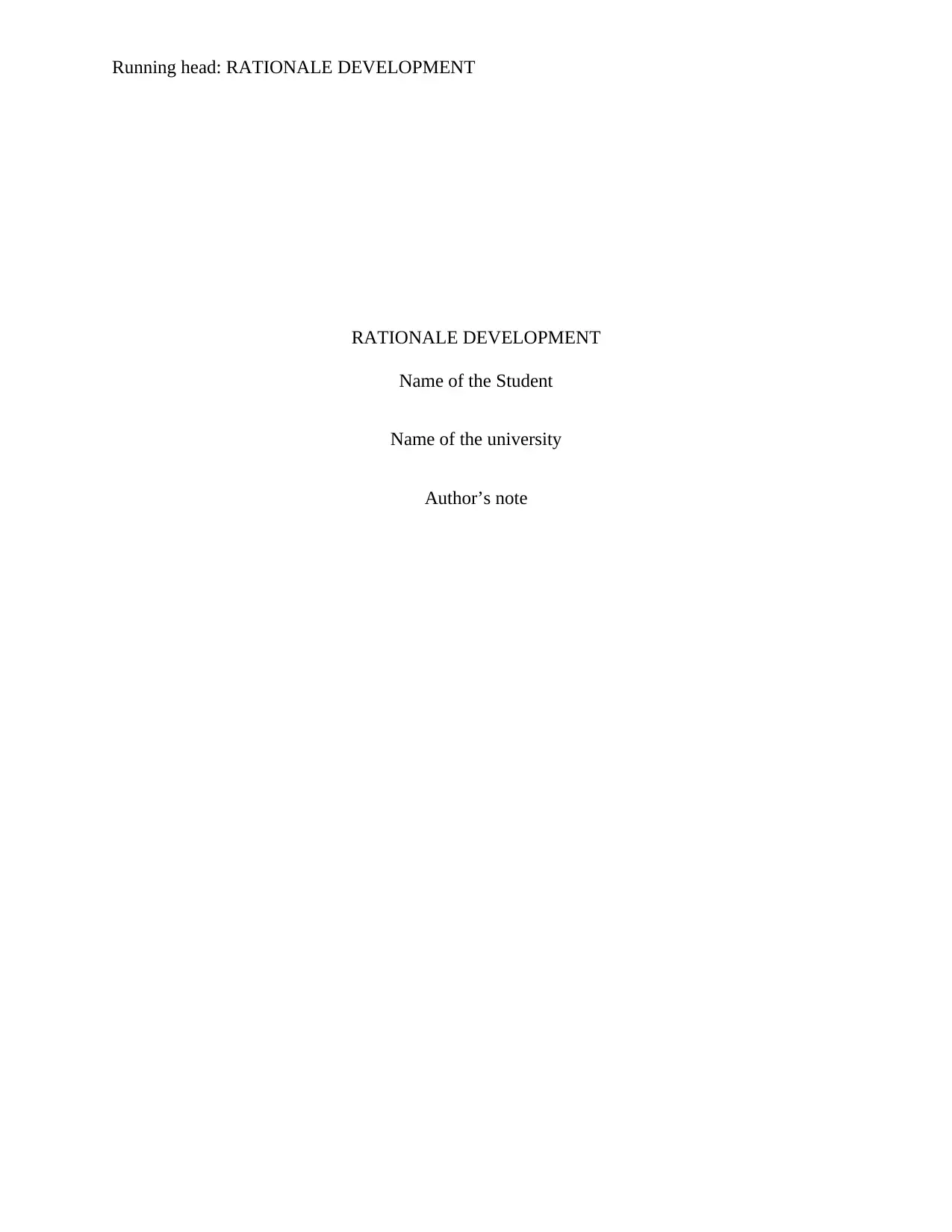
Running head: RATIONALE DEVELOPMENT
RATIONALE DEVELOPMENT
Name of the Student
Name of the university
Author’s note
RATIONALE DEVELOPMENT
Name of the Student
Name of the university
Author’s note
Paraphrase This Document
Need a fresh take? Get an instant paraphrase of this document with our AI Paraphraser
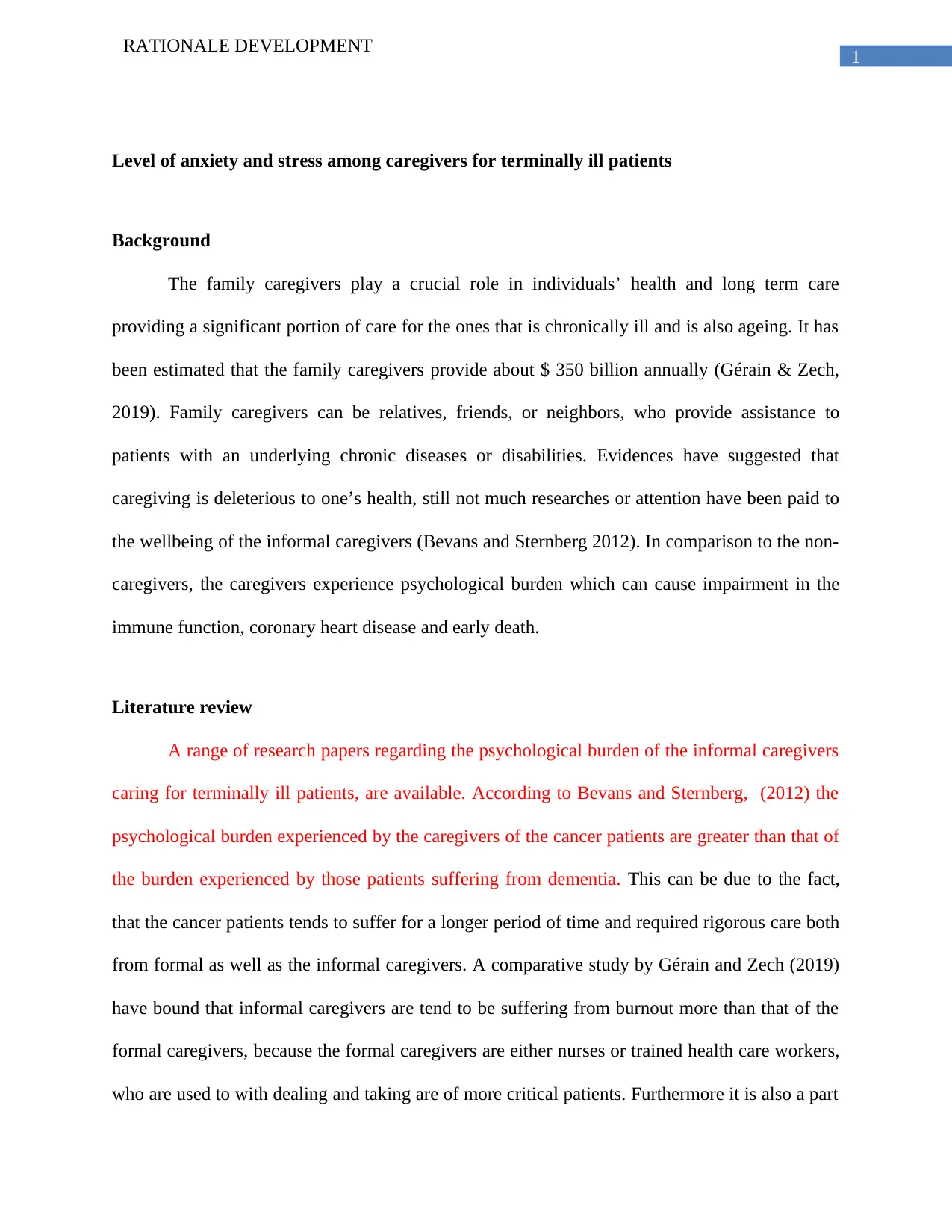
1
RATIONALE DEVELOPMENT
Level of anxiety and stress among caregivers for terminally ill patients
Background
The family caregivers play a crucial role in individuals’ health and long term care
providing a significant portion of care for the ones that is chronically ill and is also ageing. It has
been estimated that the family caregivers provide about $ 350 billion annually (Gérain & Zech,
2019). Family caregivers can be relatives, friends, or neighbors, who provide assistance to
patients with an underlying chronic diseases or disabilities. Evidences have suggested that
caregiving is deleterious to one’s health, still not much researches or attention have been paid to
the wellbeing of the informal caregivers (Bevans and Sternberg 2012). In comparison to the non-
caregivers, the caregivers experience psychological burden which can cause impairment in the
immune function, coronary heart disease and early death.
Literature review
A range of research papers regarding the psychological burden of the informal caregivers
caring for terminally ill patients, are available. According to Bevans and Sternberg, (2012) the
psychological burden experienced by the caregivers of the cancer patients are greater than that of
the burden experienced by those patients suffering from dementia. This can be due to the fact,
that the cancer patients tends to suffer for a longer period of time and required rigorous care both
from formal as well as the informal caregivers. A comparative study by Gérain and Zech (2019)
have bound that informal caregivers are tend to be suffering from burnout more than that of the
formal caregivers, because the formal caregivers are either nurses or trained health care workers,
who are used to with dealing and taking are of more critical patients. Furthermore it is also a part
RATIONALE DEVELOPMENT
Level of anxiety and stress among caregivers for terminally ill patients
Background
The family caregivers play a crucial role in individuals’ health and long term care
providing a significant portion of care for the ones that is chronically ill and is also ageing. It has
been estimated that the family caregivers provide about $ 350 billion annually (Gérain & Zech,
2019). Family caregivers can be relatives, friends, or neighbors, who provide assistance to
patients with an underlying chronic diseases or disabilities. Evidences have suggested that
caregiving is deleterious to one’s health, still not much researches or attention have been paid to
the wellbeing of the informal caregivers (Bevans and Sternberg 2012). In comparison to the non-
caregivers, the caregivers experience psychological burden which can cause impairment in the
immune function, coronary heart disease and early death.
Literature review
A range of research papers regarding the psychological burden of the informal caregivers
caring for terminally ill patients, are available. According to Bevans and Sternberg, (2012) the
psychological burden experienced by the caregivers of the cancer patients are greater than that of
the burden experienced by those patients suffering from dementia. This can be due to the fact,
that the cancer patients tends to suffer for a longer period of time and required rigorous care both
from formal as well as the informal caregivers. A comparative study by Gérain and Zech (2019)
have bound that informal caregivers are tend to be suffering from burnout more than that of the
formal caregivers, because the formal caregivers are either nurses or trained health care workers,
who are used to with dealing and taking are of more critical patients. Furthermore it is also a part
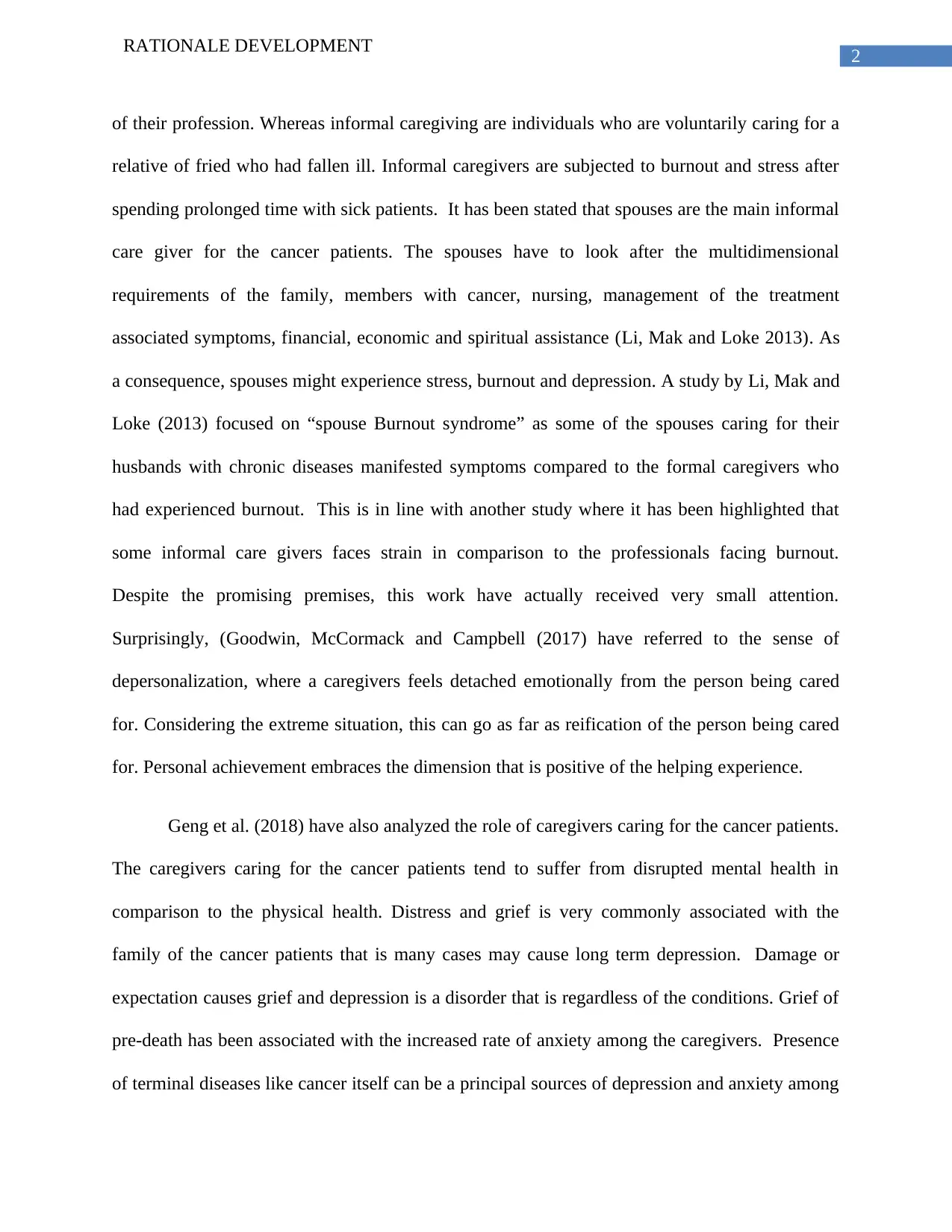
2
RATIONALE DEVELOPMENT
of their profession. Whereas informal caregiving are individuals who are voluntarily caring for a
relative of fried who had fallen ill. Informal caregivers are subjected to burnout and stress after
spending prolonged time with sick patients. It has been stated that spouses are the main informal
care giver for the cancer patients. The spouses have to look after the multidimensional
requirements of the family, members with cancer, nursing, management of the treatment
associated symptoms, financial, economic and spiritual assistance (Li, Mak and Loke 2013). As
a consequence, spouses might experience stress, burnout and depression. A study by Li, Mak and
Loke (2013) focused on “spouse Burnout syndrome” as some of the spouses caring for their
husbands with chronic diseases manifested symptoms compared to the formal caregivers who
had experienced burnout. This is in line with another study where it has been highlighted that
some informal care givers faces strain in comparison to the professionals facing burnout.
Despite the promising premises, this work have actually received very small attention.
Surprisingly, (Goodwin, McCormack and Campbell (2017) have referred to the sense of
depersonalization, where a caregivers feels detached emotionally from the person being cared
for. Considering the extreme situation, this can go as far as reification of the person being cared
for. Personal achievement embraces the dimension that is positive of the helping experience.
Geng et al. (2018) have also analyzed the role of caregivers caring for the cancer patients.
The caregivers caring for the cancer patients tend to suffer from disrupted mental health in
comparison to the physical health. Distress and grief is very commonly associated with the
family of the cancer patients that is many cases may cause long term depression. Damage or
expectation causes grief and depression is a disorder that is regardless of the conditions. Grief of
pre-death has been associated with the increased rate of anxiety among the caregivers. Presence
of terminal diseases like cancer itself can be a principal sources of depression and anxiety among
RATIONALE DEVELOPMENT
of their profession. Whereas informal caregiving are individuals who are voluntarily caring for a
relative of fried who had fallen ill. Informal caregivers are subjected to burnout and stress after
spending prolonged time with sick patients. It has been stated that spouses are the main informal
care giver for the cancer patients. The spouses have to look after the multidimensional
requirements of the family, members with cancer, nursing, management of the treatment
associated symptoms, financial, economic and spiritual assistance (Li, Mak and Loke 2013). As
a consequence, spouses might experience stress, burnout and depression. A study by Li, Mak and
Loke (2013) focused on “spouse Burnout syndrome” as some of the spouses caring for their
husbands with chronic diseases manifested symptoms compared to the formal caregivers who
had experienced burnout. This is in line with another study where it has been highlighted that
some informal care givers faces strain in comparison to the professionals facing burnout.
Despite the promising premises, this work have actually received very small attention.
Surprisingly, (Goodwin, McCormack and Campbell (2017) have referred to the sense of
depersonalization, where a caregivers feels detached emotionally from the person being cared
for. Considering the extreme situation, this can go as far as reification of the person being cared
for. Personal achievement embraces the dimension that is positive of the helping experience.
Geng et al. (2018) have also analyzed the role of caregivers caring for the cancer patients.
The caregivers caring for the cancer patients tend to suffer from disrupted mental health in
comparison to the physical health. Distress and grief is very commonly associated with the
family of the cancer patients that is many cases may cause long term depression. Damage or
expectation causes grief and depression is a disorder that is regardless of the conditions. Grief of
pre-death has been associated with the increased rate of anxiety among the caregivers. Presence
of terminal diseases like cancer itself can be a principal sources of depression and anxiety among
⊘ This is a preview!⊘
Do you want full access?
Subscribe today to unlock all pages.

Trusted by 1+ million students worldwide
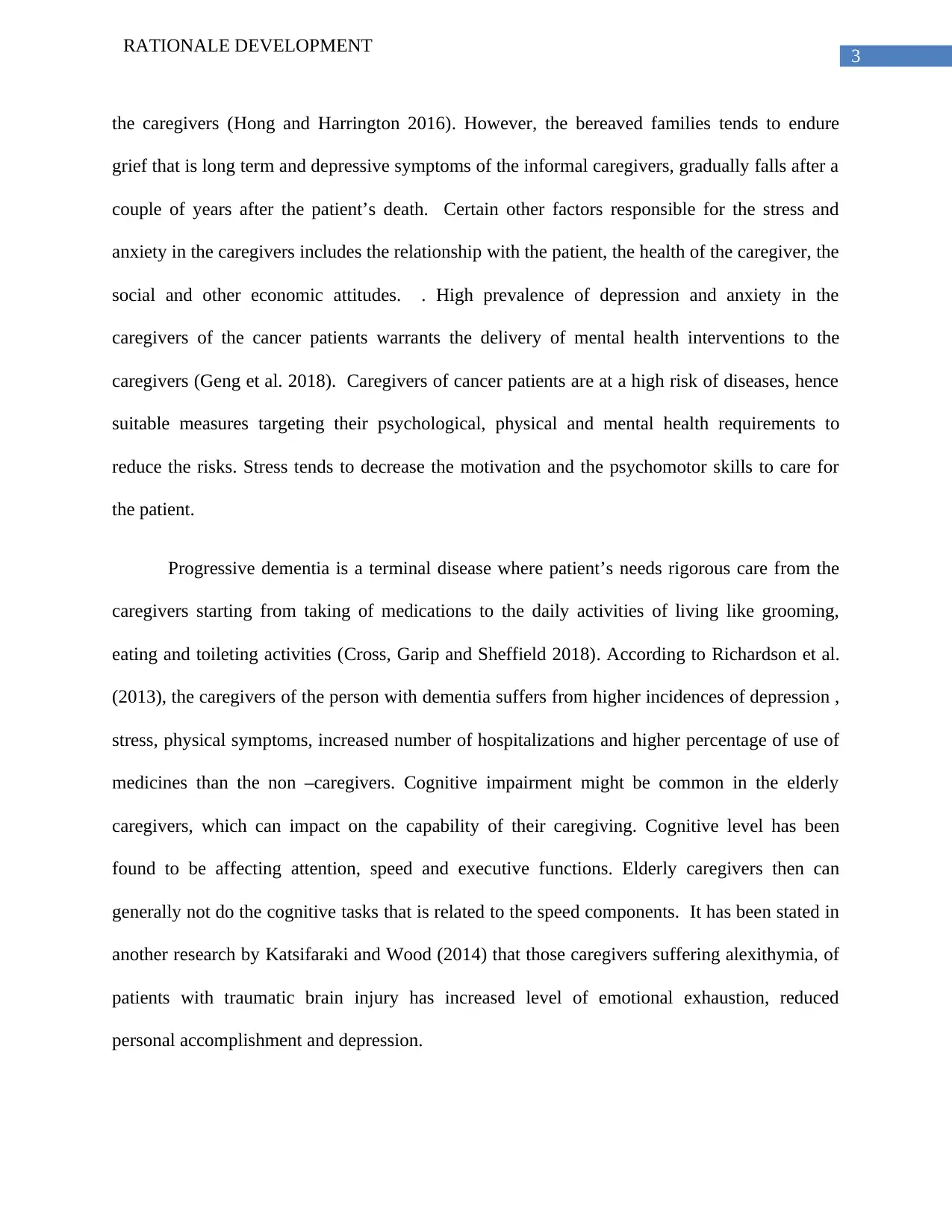
3
RATIONALE DEVELOPMENT
the caregivers (Hong and Harrington 2016). However, the bereaved families tends to endure
grief that is long term and depressive symptoms of the informal caregivers, gradually falls after a
couple of years after the patient’s death. Certain other factors responsible for the stress and
anxiety in the caregivers includes the relationship with the patient, the health of the caregiver, the
social and other economic attitudes. . High prevalence of depression and anxiety in the
caregivers of the cancer patients warrants the delivery of mental health interventions to the
caregivers (Geng et al. 2018). Caregivers of cancer patients are at a high risk of diseases, hence
suitable measures targeting their psychological, physical and mental health requirements to
reduce the risks. Stress tends to decrease the motivation and the psychomotor skills to care for
the patient.
Progressive dementia is a terminal disease where patient’s needs rigorous care from the
caregivers starting from taking of medications to the daily activities of living like grooming,
eating and toileting activities (Cross, Garip and Sheffield 2018). According to Richardson et al.
(2013), the caregivers of the person with dementia suffers from higher incidences of depression ,
stress, physical symptoms, increased number of hospitalizations and higher percentage of use of
medicines than the non –caregivers. Cognitive impairment might be common in the elderly
caregivers, which can impact on the capability of their caregiving. Cognitive level has been
found to be affecting attention, speed and executive functions. Elderly caregivers then can
generally not do the cognitive tasks that is related to the speed components. It has been stated in
another research by Katsifaraki and Wood (2014) that those caregivers suffering alexithymia, of
patients with traumatic brain injury has increased level of emotional exhaustion, reduced
personal accomplishment and depression.
RATIONALE DEVELOPMENT
the caregivers (Hong and Harrington 2016). However, the bereaved families tends to endure
grief that is long term and depressive symptoms of the informal caregivers, gradually falls after a
couple of years after the patient’s death. Certain other factors responsible for the stress and
anxiety in the caregivers includes the relationship with the patient, the health of the caregiver, the
social and other economic attitudes. . High prevalence of depression and anxiety in the
caregivers of the cancer patients warrants the delivery of mental health interventions to the
caregivers (Geng et al. 2018). Caregivers of cancer patients are at a high risk of diseases, hence
suitable measures targeting their psychological, physical and mental health requirements to
reduce the risks. Stress tends to decrease the motivation and the psychomotor skills to care for
the patient.
Progressive dementia is a terminal disease where patient’s needs rigorous care from the
caregivers starting from taking of medications to the daily activities of living like grooming,
eating and toileting activities (Cross, Garip and Sheffield 2018). According to Richardson et al.
(2013), the caregivers of the person with dementia suffers from higher incidences of depression ,
stress, physical symptoms, increased number of hospitalizations and higher percentage of use of
medicines than the non –caregivers. Cognitive impairment might be common in the elderly
caregivers, which can impact on the capability of their caregiving. Cognitive level has been
found to be affecting attention, speed and executive functions. Elderly caregivers then can
generally not do the cognitive tasks that is related to the speed components. It has been stated in
another research by Katsifaraki and Wood (2014) that those caregivers suffering alexithymia, of
patients with traumatic brain injury has increased level of emotional exhaustion, reduced
personal accomplishment and depression.
Paraphrase This Document
Need a fresh take? Get an instant paraphrase of this document with our AI Paraphraser
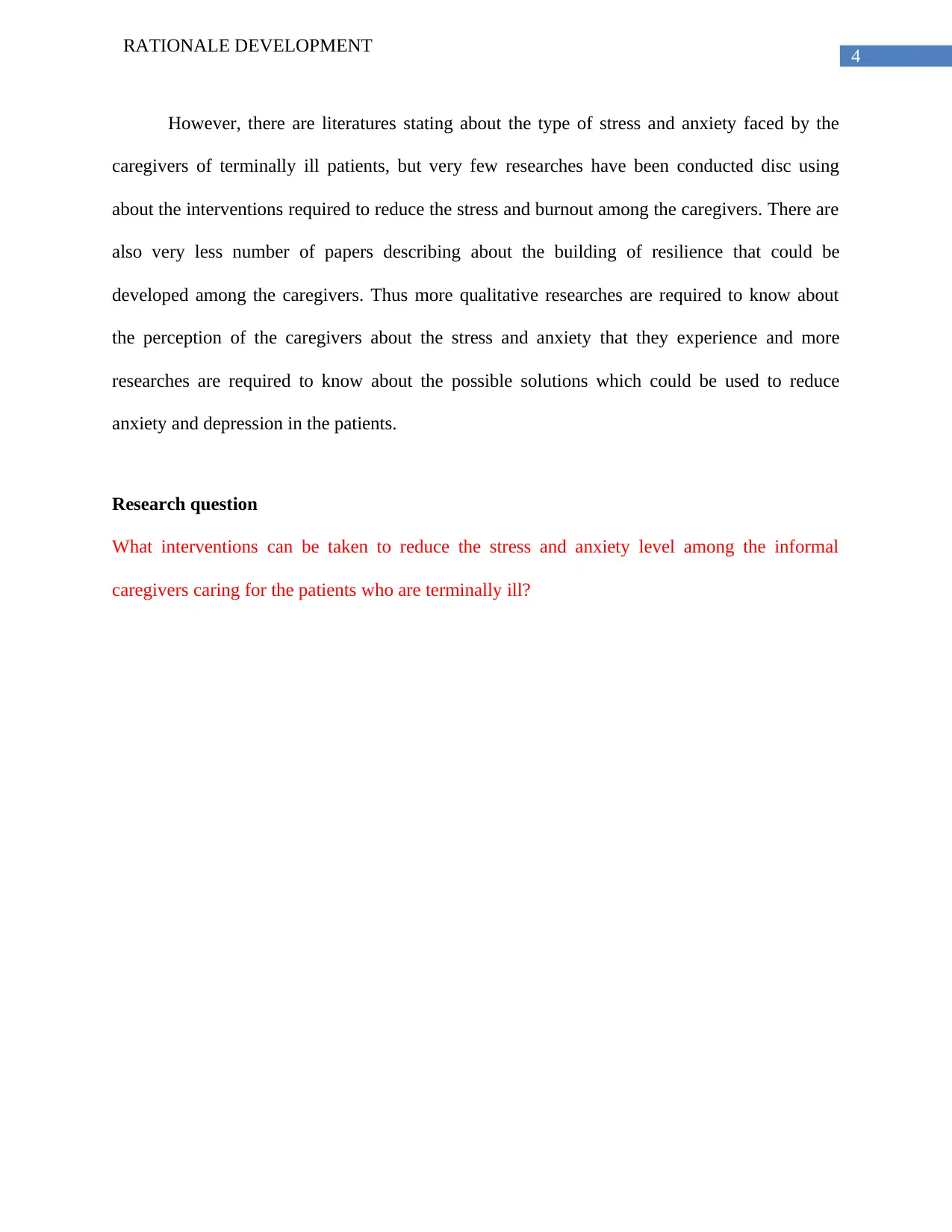
4
RATIONALE DEVELOPMENT
However, there are literatures stating about the type of stress and anxiety faced by the
caregivers of terminally ill patients, but very few researches have been conducted disc using
about the interventions required to reduce the stress and burnout among the caregivers. There are
also very less number of papers describing about the building of resilience that could be
developed among the caregivers. Thus more qualitative researches are required to know about
the perception of the caregivers about the stress and anxiety that they experience and more
researches are required to know about the possible solutions which could be used to reduce
anxiety and depression in the patients.
Research question
What interventions can be taken to reduce the stress and anxiety level among the informal
caregivers caring for the patients who are terminally ill?
RATIONALE DEVELOPMENT
However, there are literatures stating about the type of stress and anxiety faced by the
caregivers of terminally ill patients, but very few researches have been conducted disc using
about the interventions required to reduce the stress and burnout among the caregivers. There are
also very less number of papers describing about the building of resilience that could be
developed among the caregivers. Thus more qualitative researches are required to know about
the perception of the caregivers about the stress and anxiety that they experience and more
researches are required to know about the possible solutions which could be used to reduce
anxiety and depression in the patients.
Research question
What interventions can be taken to reduce the stress and anxiety level among the informal
caregivers caring for the patients who are terminally ill?
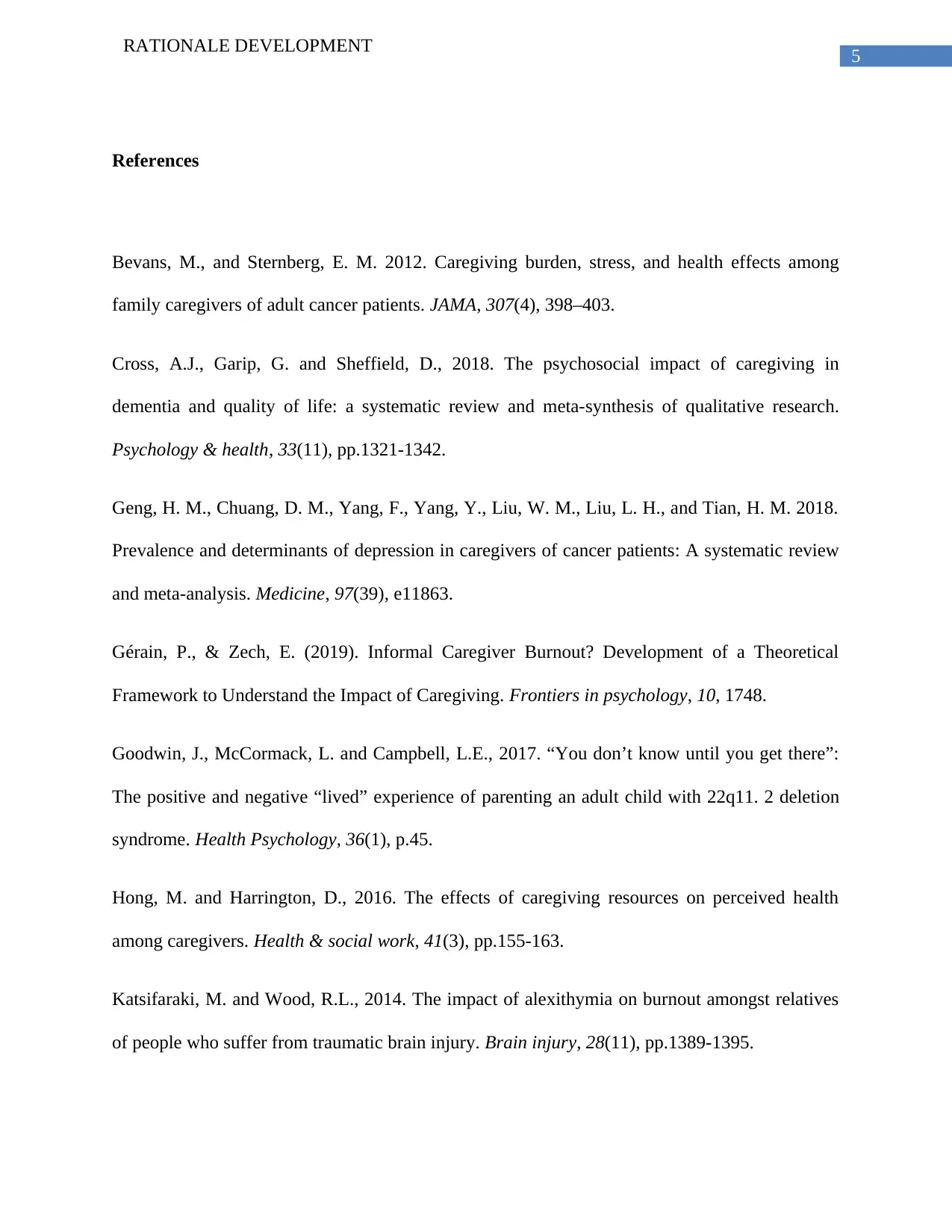
5
RATIONALE DEVELOPMENT
References
Bevans, M., and Sternberg, E. M. 2012. Caregiving burden, stress, and health effects among
family caregivers of adult cancer patients. JAMA, 307(4), 398–403.
Cross, A.J., Garip, G. and Sheffield, D., 2018. The psychosocial impact of caregiving in
dementia and quality of life: a systematic review and meta-synthesis of qualitative research.
Psychology & health, 33(11), pp.1321-1342.
Geng, H. M., Chuang, D. M., Yang, F., Yang, Y., Liu, W. M., Liu, L. H., and Tian, H. M. 2018.
Prevalence and determinants of depression in caregivers of cancer patients: A systematic review
and meta-analysis. Medicine, 97(39), e11863.
Gérain, P., & Zech, E. (2019). Informal Caregiver Burnout? Development of a Theoretical
Framework to Understand the Impact of Caregiving. Frontiers in psychology, 10, 1748.
Goodwin, J., McCormack, L. and Campbell, L.E., 2017. “You don’t know until you get there”:
The positive and negative “lived” experience of parenting an adult child with 22q11. 2 deletion
syndrome. Health Psychology, 36(1), p.45.
Hong, M. and Harrington, D., 2016. The effects of caregiving resources on perceived health
among caregivers. Health & social work, 41(3), pp.155-163.
Katsifaraki, M. and Wood, R.L., 2014. The impact of alexithymia on burnout amongst relatives
of people who suffer from traumatic brain injury. Brain injury, 28(11), pp.1389-1395.
RATIONALE DEVELOPMENT
References
Bevans, M., and Sternberg, E. M. 2012. Caregiving burden, stress, and health effects among
family caregivers of adult cancer patients. JAMA, 307(4), 398–403.
Cross, A.J., Garip, G. and Sheffield, D., 2018. The psychosocial impact of caregiving in
dementia and quality of life: a systematic review and meta-synthesis of qualitative research.
Psychology & health, 33(11), pp.1321-1342.
Geng, H. M., Chuang, D. M., Yang, F., Yang, Y., Liu, W. M., Liu, L. H., and Tian, H. M. 2018.
Prevalence and determinants of depression in caregivers of cancer patients: A systematic review
and meta-analysis. Medicine, 97(39), e11863.
Gérain, P., & Zech, E. (2019). Informal Caregiver Burnout? Development of a Theoretical
Framework to Understand the Impact of Caregiving. Frontiers in psychology, 10, 1748.
Goodwin, J., McCormack, L. and Campbell, L.E., 2017. “You don’t know until you get there”:
The positive and negative “lived” experience of parenting an adult child with 22q11. 2 deletion
syndrome. Health Psychology, 36(1), p.45.
Hong, M. and Harrington, D., 2016. The effects of caregiving resources on perceived health
among caregivers. Health & social work, 41(3), pp.155-163.
Katsifaraki, M. and Wood, R.L., 2014. The impact of alexithymia on burnout amongst relatives
of people who suffer from traumatic brain injury. Brain injury, 28(11), pp.1389-1395.
⊘ This is a preview!⊘
Do you want full access?
Subscribe today to unlock all pages.

Trusted by 1+ million students worldwide
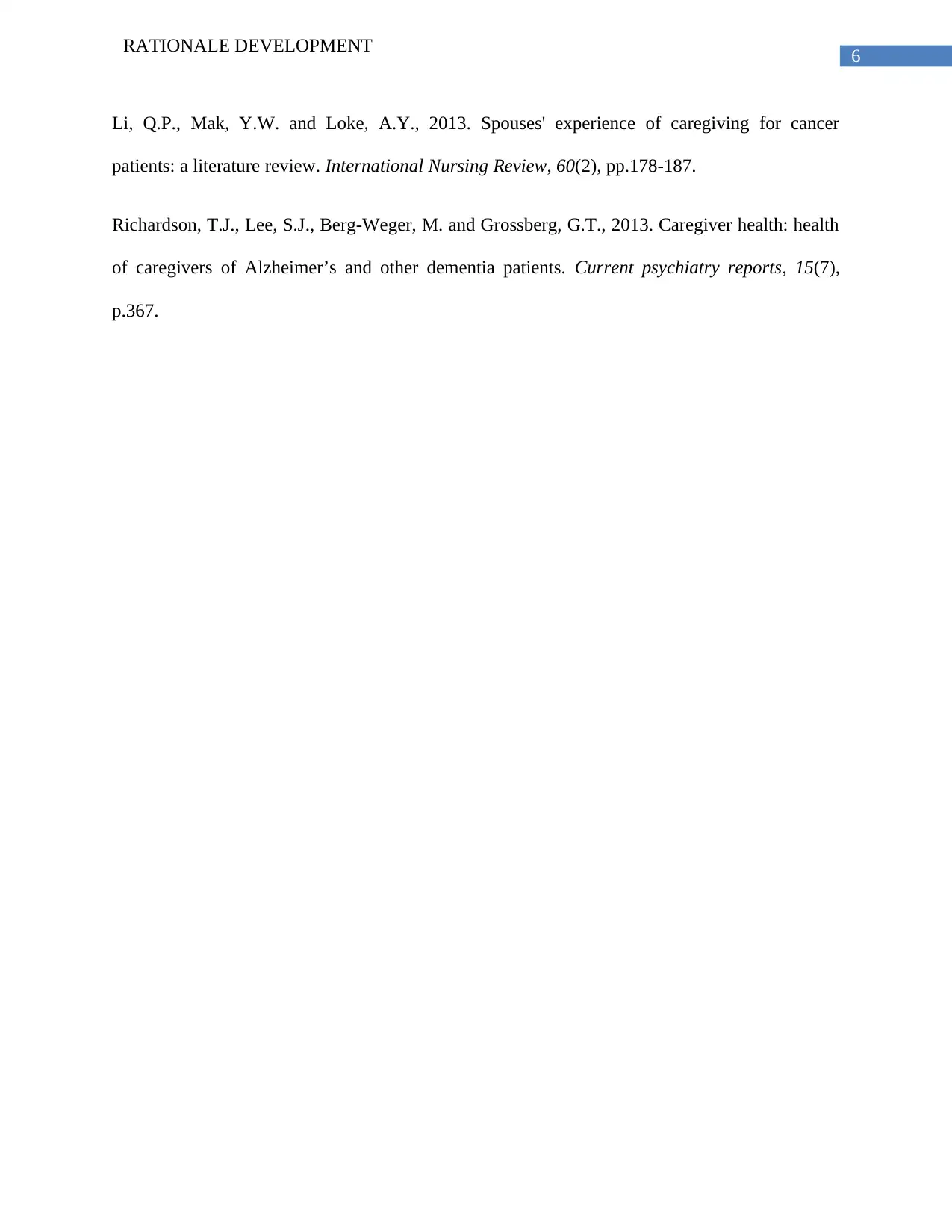
6
RATIONALE DEVELOPMENT
Li, Q.P., Mak, Y.W. and Loke, A.Y., 2013. Spouses' experience of caregiving for cancer
patients: a literature review. International Nursing Review, 60(2), pp.178-187.
Richardson, T.J., Lee, S.J., Berg-Weger, M. and Grossberg, G.T., 2013. Caregiver health: health
of caregivers of Alzheimer’s and other dementia patients. Current psychiatry reports, 15(7),
p.367.
RATIONALE DEVELOPMENT
Li, Q.P., Mak, Y.W. and Loke, A.Y., 2013. Spouses' experience of caregiving for cancer
patients: a literature review. International Nursing Review, 60(2), pp.178-187.
Richardson, T.J., Lee, S.J., Berg-Weger, M. and Grossberg, G.T., 2013. Caregiver health: health
of caregivers of Alzheimer’s and other dementia patients. Current psychiatry reports, 15(7),
p.367.
1 out of 7
Related Documents
Your All-in-One AI-Powered Toolkit for Academic Success.
+13062052269
info@desklib.com
Available 24*7 on WhatsApp / Email
![[object Object]](/_next/static/media/star-bottom.7253800d.svg)
Unlock your academic potential
Copyright © 2020–2026 A2Z Services. All Rights Reserved. Developed and managed by ZUCOL.





